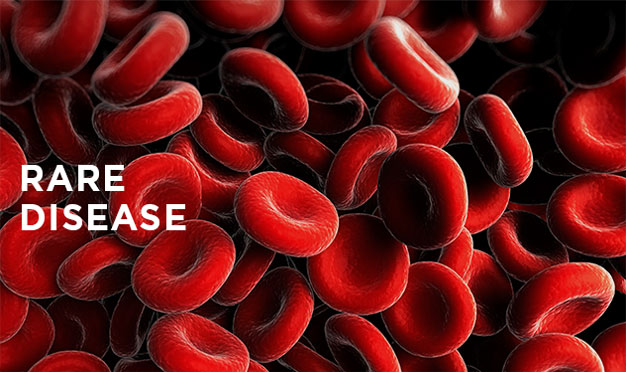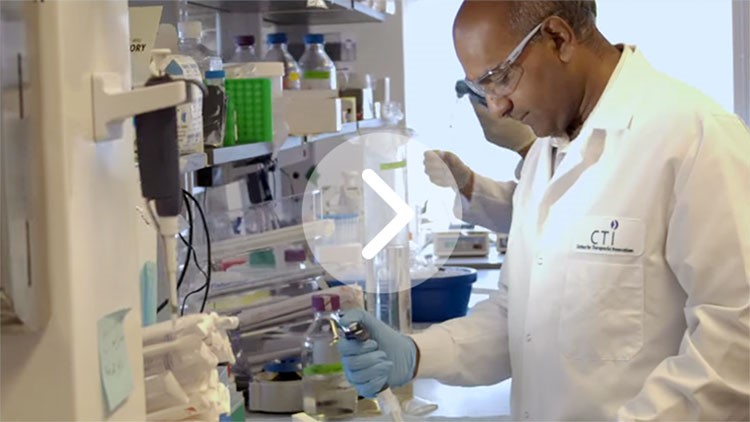Positioning Pfizer
for Sustainable Innovation

Pfizer's purpose is to innovate to bring patients therapies that significantly improve their lives. R&D is at the heart of fulfilling Pfizer's purpose as we work to translate advanced science and technologies into the therapies that matter most.

Today, we are at a unique moment in biomedical innovation. More than a decade after the decoding of the human genome, we have a fundamentally better understanding of human biology and what causes disease. We also have learned that it takes more than just great science to deliver meaningful potential new therapies. Over the last few years, Pfizer has better integrated science and business, transforming our approach to be more collaborative, more focused, and, ultimately, more powerful for patients, with a goal of delivering a sustainable flow of important new medicines and vaccines, year after year.
Focusing on Unmet Needs
We focus our efforts in core areas where we believe Pfizer is best positioned to bring unique, needed therapies to patients. These core areas include immunology and inflammation, cardiovascular and metabolic disease, oncology, vaccines, neuroscience and pain, rare diseases, and biosimilars.
Collaborating in new and dynamic ways with other innovators across the health landscape is key to our R&D approach. Our partners include academic scientists, patient foundations, governments, other biopharmaceutical companies, and treating physicians — expanding the R&D ecosystem to better serve both patients' needs and our business.
Today our Phase 1 to registration pipeline is composed of more than 80 innovative therapies, including potentially first-in-class vaccines against two deadly hospital-acquired infections, new potential antibodies for lupus and high cholesterol, and the next generation of targeted potential therapies for cancer. We are also building upon a heritage of developing safe and effective biologic medicines to develop high quality biosimilars that may broaden patient access with lower-cost alternative biologic therapies.

Valerie Clerin
Project Lead
PDE5 inhibitor Diabetic Nephropathy Program |
It is extremely motivating and a privilege to come to work every day to advance a drug candidate that has the potential of dramatically improving patient lives by slowing the progression of kidney disease and delaying or preventing onset of dialysis. |

David Gray
Neuroscience Research Unit Project Lead for the D1 Partial Agonist Program
|
Directed innovation is at the core of all of our successes. In fact, the very premise of starting the D1 program at Pfizer was the belief that we could innovate and succeed on a difficult mechanism where many others had failed, and thereby potentially help patients with Parkinson's disease live a better life. |
Our Therapeutic Areas of Focus






In addition, we pursue R&D in support of our Biosimilars portfolio.
Patents Issued to Pfizer in 2014 Alone
Pioneering
New Collaborations
Just as science has advanced tremendously over the last decade, so has our understanding of how we need to collaborate to advance innovation more quickly and effectively. Our creative approach to external collaboration has resulted in new types of arrangements with government, academia, patient advocacy groups and the biomedical industry.




Kevin Lee
Chief Scientific Officer
Rare Disease Research Unit |
Pfizer has a strong commitment to working in rare diseases. However, the challenge is too great for any one of us to go it alone. Through innovative partnerships with both academia and industry we hope to progress gene therapy research and bring forth the next generation of potential life-changing therapies for patients living with serious diseases. |


Global Strategic Alliance in Immuno-Oncology
Pfizer and Merck KGaA, Darmstadt, Germany have agreed to jointly develop and commercialize avelumab MSB0010718C, an investigational anti-PD-L1 antibody currently in development as a potential treatment for multiple types of cancer. This global alliance enables Pfizer and Merck KGaA to combine complementary strengths with the goal of meeting the needs of patients with multiple types of cancer.
Together, Pfizer and Merck KGaA will explore the therapeutic potential of this novel anti-PD-L1 antibody as a single agent, as well as in various combinations with Pfizer's and Merck KGaA's broad portfolios of approved and investigational oncology therapies. Collaboration on up to 20 high priority immuno-oncology clinical development programs is expected to commence in 2015, including up to six trials (Phase 2 or 3) that could be pivotal for potential product registrations.
Separate from the PD-L1 programs, Pfizer and Merck KGaA will also combine resources and expertise to advance Pfizer's anti-PD-1 antibody into Phase 1 trials, and have also agreed to co-promote Pfizer's Xalkori® in the U.S. and several other key markets.
Connections with Foundations


A unique model for collaboration, CTI is designed to bridge the gap between early scientific discovery and its translation into new medicines, with Pfizer scientists working side by side with academic researchers. Currently, it has 27 projects ongoing across six therapeutic areas.
CTI continues to deepen its connection with patient foundations and patient advocacy groups. In addition to its network of 25 academic medical centers and its collaboration with the National Institutes of Health, CTI is working with the following five not-for-profit foundations:
Alliance for Lupus Research (ALR)
CTI is collaborating with ALR to discover and develop new therapies for patients living with lupus. As part of this first-of-its-kind collaboration in lupus, CTI and ALR jointly support novel translational research projects driven by leading academic medical centers within the CTI network.
Alzheimer's Drug Discovery Foundation (ADDF)
With an estimated 5.4 million Americans living with Alzheimer's disease today, CTI teamed up with ADDF in an effort to find new therapies for people suffering from Alzheimer's disease. As with its other partners, CTI collaborates with ADDF to solicit, select and support innovative research that could lead to a treatment for this disease.
Crohn's and Colitis Foundation of America
This collaboration involves the co-funding of research projects that focus on validated targets in Crohn's disease and ulcerative colitis, the two most common types of inflammatory bowel disease. The collaboration is the Foundation's first joint funding agreement with a pharmaceutical company.
Foundation for Sarcoidosis Research (FSR)
The collaboration with FSR is focused on creating novel therapies for sarcoidosis. FSR is providing guidance and expertise on each research project. Investigators working in sarcoidosis are encouraged to submit project proposals to CTI.
Juvenile Diabetes Research Foundation (JDRF)
With JDRF, CTI is working to support the development and translation of promising diabetes research in the fields of immune tolerance, diabetic nephropathy and beta cell health. Capitalizing on JDRF's expertise in the field of Type-1 diabetes research and CTI's network of academic medical centers, the organizations jointly identify, fund and drive promising research projects.

Watch the Focus on Lupus — Pfizer Centers for Therapeutic Innovation (CTI) video
Additional Collaborations


The Global Medical Excellence Cluster in the UK entered into a five-year collaborative agreement with Pfizer, under Pfizer's Rare Disease Consortium, a new collaborative approach in the discovery and development of potential new treatments for rare diseases. The Rare Disease Consortium brings together experts in the field — academic researchers, clinician practitioners and patient and advocacy groups — in an effort to accelerate the discovery process for the benefit of patients.


The National Institutes of Health, the Food and Drug Administration, 10 biopharmaceutical companies (including Pfizer) and a number of nonprofit organizations have announced on February 10, 2014, the launch of a bold new venture to transform the current model for developing new diagnostics and treatments of disease by jointly identifying and validating promising biological targets. These participants are expected to invest $230 million in expertise and resources over five years to increase the number of new diagnostics and therapies for patients and reduce the time and cost of developing treatments for Alzheimer's disease, type 2 diabetes, and the autoimmune disorders rheumatoid arthritis and systemic lupus erythematosus. A critical component of the venture is that the data generated will be made publicly accessible to the broad biomedical community.


Pfizer entered into an agreement with MedGenesis Therapeutix, Inc. to obtain an exclusive, worldwide option to license its glial cell line-derived neurotrophic factor (GDNF) protein and convection enhanced delivery (CED) technology to be used in a potential disease-modifying treatment for Parkinson's disease, which Pfizer has identified as an important area of unmet medical need. This innovative approach to treating Parkinson's disease involves the direct intra-parenchymal infusion of GDNF into the brain, using MedGenesis' CED technology.


23andMe, the leading personal genetics company, and Pfizer have combined forces to enroll 10,000 people with inflammatory bowel disease in a research initiative designed to explore the genetic factors associated with the onset, progression and severity of the disease, as well as its response to treatments.


Pfizer and Cellectis entered into a global strategic collaboration to develop Chimeric Antigen Receptor T-cell (CAR-T) immunotherapies in the field of oncology, directed at select targets. This leading immuno-oncology collaboration aimed at delivering immunotherapies is built upon Cellectis' advanced genome editing and cell engineering capability and Pfizer's cutting-edge biotherapeutic cancer therapy platform. Combining the innovation and scientific expertise of Cellectis with Pfizer's deep oncology and immunology experience creates a world-class partnership designed to deliver a new generation of CAR-T immunotherapies for cancer patients with urgent medical needs.


Spark Therapeutics and Pfizer will collaborate to progress the clinical program for SPK-FIX, a program incorporating a bio-engineered Adeno-Associated Virus (AAV) vector for the potential treatment of hemophilia B. The fundamental understanding of the biology of hereditary rare diseases, coupled with advances in the technology to harness disarmed viruses as gene delivery vehicles, provide a ripe opportunity to investigate the next wave of potential life-changing therapies for patients. Disarmed viruses can be redesigned with the genetic instructions to produce a missing enzyme or therapeutic protein. They are then called vectors, and in practical terms are carriers for therapeutic genes.



